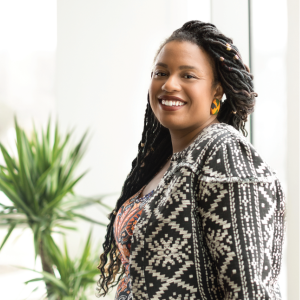Connecting the Dots on Diversity
BY MARY LEE HARVEY DIRCKS
Photography by Anna Finocchiaro
Ashlei Spivey is dramatically impacting the local landscape surrounding diversity, equity and inclusion. She created Ay Spivey, LLC, the Young Black and Influential Awards and the “I Be Black Girl” social and professional network—all aimed at changing the scope of how individuals and organizations navigate their liberation journeys.
Spivey approaches conversations about how the principles of diversity and inclusion intersect from a social justice perspective rather than a bottom-line workforce recruitment way of thinking. “Most people don’t think about diversity and inclusion as a social justice imperative,” Spivey says.
“Social justice really looks at power, access, opportunity and oppression within systems.” Spivey ties that social justice framework to organizational development systems, raising awareness that there is a wider community macro need for why organizations should talk about diversity, equity and inclusion.
“There are so many gaps about how organizations, businesses and nonprofits relate to social justice. I felt like there was a great opportunity to help people connect the dots they didn’t think existed and really humanize this work,” Spivey says about her consulting business. Through Ay Spivey, LLC, she speaks at community events, facilitates workshops and provides services for organizations to build diversity, inclusion and equity practices into their people systems. “My work centers around this idea of total system change versus interventions or band-aids,” she says.
One example Spivey uses to explain is to look at a company’s desire to build a diverse workforce. An intervention or band-aid approach would be to recruit people with the identities that are missing from their workforce by going to multiple places where those people are. A total system change, however, requires an organization’s leadership to look at what needs to change in the culture of the organization to create an environment where people with those identities will feel like they can belong.
“Changing that paradigm of thought addresses the culture of the system that organization is operating or living in,” she says. Another gap Spivey sought to fill surrounds affirming Black leadership from a more inclusive perspective. Last year, she launched an initiative for young Black leaders to be recognized for their impactful work in Omaha’s Black Community.
“The Young Black and Influential Awards came about out of a need for black people to feel like we have the space to define what success looks like for us through a community leadership lens,” she says. Ten individuals were honored at an awards dinner last June in the areas of service, activism and innovation. Awards are presented to members of the Omaha Black community in four age categories: 12 to 19 years old and people in their 20s, 30s and 40s. The second annual Young Black and Influential Awards is scheduled for June 24 this year.
Spivey was recognized as a 2018 Change Maker by the Greater Omaha Chamber Young Professionals group for her work in creating this platform. Spivey didn’t stop there. She saw another gap in the Black community, so she created a group called “I Be Black Girl,” because, she says, her community initiatives center around empowering communities of color and creating space for people who typically don’t have space given to them.
“I Be Black Girl is a group of black women that came out of a need for connectedness and a sense of community from a social perspective, and also as professionals in different spaces.” The group holds quarterly networking events as well as smaller social gatherings such as book clubs and meet-ups.
“We are launching the first Black Women Giving Circle in Omaha in over 20 years,” Spivey says. “We have a goal to raise $10,000 this year to invest in a program that is affecting, supporting and developing Black women and girls.” The group has already gained a membership of more than 500 women. “It really took off. I kind of started it with just asking people to have lunch with me, and now we’re like a thing!” I Be Black Girl is supported by a leadership advisory board of seven dynamic Black women in the Omaha community.
Besides Spivey’s volunteer community work and her part-time consulting work through Ay Spivey, LLC, she holds a program officer position at Peter Kiewit Foundation. “I’m the first black woman to hold this role in the foundation’s history,” she says. “So I feel that I have a unique perspective and opportunity to bring my identities and abilities into a power structure and lend my equity lens to my work.”
“I have cared about my community. I’ve done different types of things in the public sector, but now I really get to make sure the system allows for people to be successful no matter what their identities are through numerous outlets,” Spivey says. “I get to do that every day, from my community work to my consulting.”

